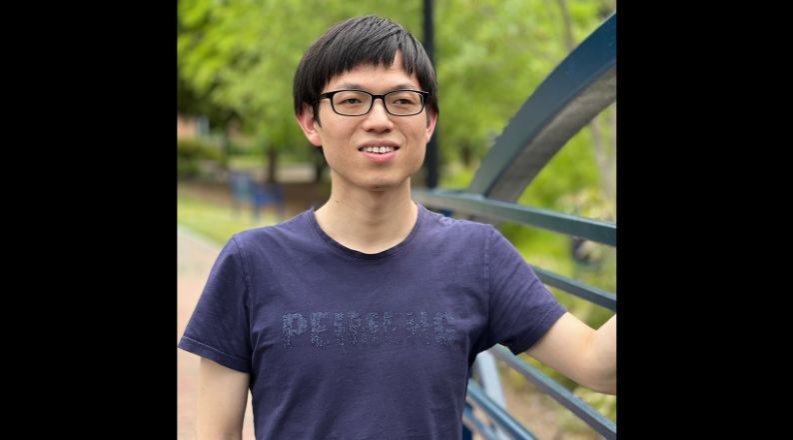By Tiffany Whitfield
Old Dominion University Mathematics doctoral student, Ronglong Fang, will apply his mathematics research skills to help further our understanding of the building blocks of matter in the Department of Energy. Fang was awarded a one-year research fellowship in the Electron-Ion Collider Center at the U.S. Department of Energy’s Thomas Jefferson National Accelerator Facility (EIC Center at Jefferson Lab).
As one of six new researchers to be awarded this fellowship, Fang will develop a scalable algorithm to monitor online data for the Electron-Ion Collider with the goal of being able to do real-time, autonomous detector calibrations.
During the next year, Fang and the other fellows will work to advance the science program and further the research of the EIC. The EIC is a one-of-a-kind physics research facility soley dedicated to uncovering fundamental questions about nature’s building blocks.
“I felt excited when I heard the news,” said Fang. Being selected as a fellow means he will work alongside of Department of Energy (DOE) physicists and scientists while pursuing a Ph.D. in Computational Applied Mathematics at ODU. “Math can be applied and used in many fields,” said Fang.
At Jefferson Lab, Fang will monitor the data projected from a detector which is always changing, in order to develop algorithms for real-time, autonomous calibrations on the detector. He gets to do research alongside his ODU Advisor and Mathematics Professor Yuesheng Xu and under the joint supervision of Dr. Markus Diefenthaler of Jefferson Lab. “We developed an online multiscale algorithm to detect changes in streaming data,” said Fang. His results indicate that this method is suitable to detect changes in a detector. “Since we have imposed a multiscale structure for streaming data, the proposed algorithm can detect the change accurately and efficiently.”
The information he is gathering will be used to help make real-time algorithms at the EIC Center at Jefferson Lab.
According to Professor Xu, “Ronglong is an outstanding graduate student who has been working under my supervision since 2019. He is working on understanding the mathematical theory of deep learning. The fellowship that he has received from Jefferson Lab is to support the development of online multiscale methods for the detection. He is now working diligently and enthusiastically on the project.”
At ODU, Fang has done research in automated data-quality monitoring and sparse machine learning. Algorithms were applied in both projects making the end results successful.
Also, he is a teaching assistant in Math 162, Pre-Calculus I, and Math 103, College Algebra, helping hundreds of students learn and apply math in their respective majors.
Prior to coming to ODU, Fang did research in Convex/Non-Convex Optimization and earned his Bachelor of Arts degree from Jilin University in Changchun, Jilin, China.
Fang will be the first in his family to earn a Ph.D., after which he would like to do a post-doctoral program and apply mathematics as a researcher.
The fellowship program is funded by the Commonwealth of Virginia. All EIC fellows must spend at least half of their time at Jefferson Lab in Newport News, Virginia, during their fellowship.



